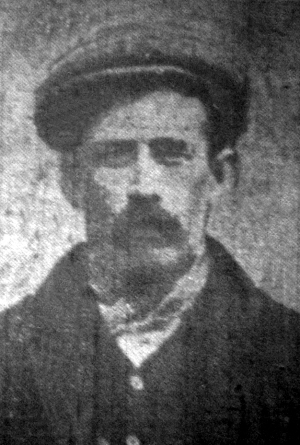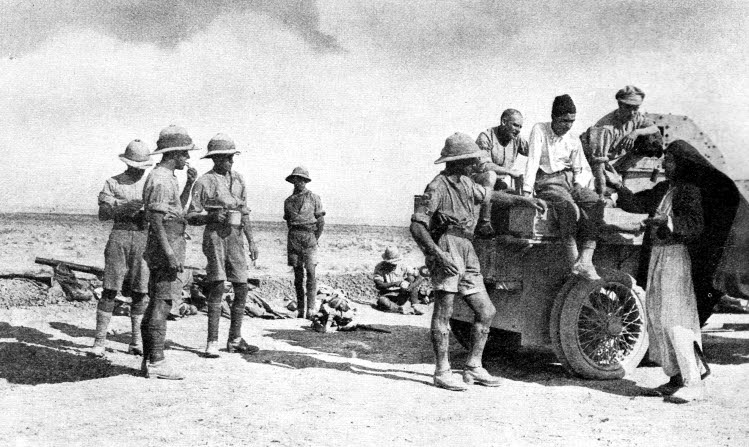
Allen Cooper was born in Ossett in late 1874 and he married Lydia Balmforth at Ossett in 1901. At the time of his marriage, Allen was living with his parents at Sandbed Terrace, Ossett. Two doors away from the Cooper family is 4 year-old Kisby Brook. In 1911, Allen and Lydia Cooper, with two children aged 7 and 8 years-old, are living at the back of No. 3, Co-op, Streetside, Ossett. Allen was a hewer in a coal mine and Lydia was a blanket weaver.
Private Allen Cooper enlisted at Dewsbury, first with the East Lancashire Regiment (3/22432) before later joining the Northumberland Fusiliers, 2nd Battalion in Iraq. The 6th (Service) Battalion, the East Lancashire Regiment were selected for the Army of Occupation in Mesopotamia and were posted to join 34th Indian Infantry Brigade in 1917. The 2nd Garrison Battalion, Northumberland Fusiliers arrived in Basra, Iraq in late February or early March 1917. The Battalion lost 179 men during the First World War and the majority died from sickness in Mesopotamia.
The “Ossett Observer” carried this report of Private Allen Cooper’s death:
“Private Allen Cooper, of the Northumberland Fusiliers, a man well-known in the Flushdyke and Street-side areas of the borough, where he has lived practically all of his life, is reported by the military authorities to have died, from heatstroke, in Mesopatamia, where he had been serving with the British Expeditionary Force for nearly a year and a half. The deceased, who was 42 years of age, leaves a widow and five children, who reside in Dewsbury-road. At the time the deceased joined the forces, he worked at Shaw Cross Colliery, and for many years he was employed at the Pildacre colliery, prior to it being closed. The date of his death is given as July 17th last.”
Mesopotamia, now modern Iraq, was part of the Turkish Ottoman Empire at the start of the Great War. With oil interests in the region, British troops were first despatched to the region in 1914 to prevent the Turks from interrupting the supply of oil, much of which was used by the Royal Navy. Gradually Mesopotamia, or Mespot, turned into a full-scale war with large numbers of British and Indian Army troops involved. In 1916 there was a major defeat at Kut, but gradually the war turned in Britain’s favour leading to the defeat of the Ottoman Empire in the region in 1918.1

Above: British soldiers in Mesopotamia (Iraq) during WW1.
Sickness had been rife nearly every soldier had suffered at some time from dysentery, poor rations had also brought a bout of scurvy amongst the troops, and at the beginning of May 1916, there had been an outbreak of cholera. Temperatures in the shade of over a hundred and fifteen degrees Fahrenheit were common the scorching wind, blowing like a blast furnace had burned and rasped skin unaccustomed to a tropical climate. To add to the ‘Tommies’ miseries had been the flies, which had fed off the dead of No Man’s Land. Apart from the diseases, which they had undoubtedly carried and spread, the discomfort of their presence had almost been unbearable. The air had been filled with their buzzing and every man had carried his own swarm for they had settled on every portion of his anatomy where a hand could not reach to brush them off. In addition every cooking pot, dish, and every scrap of food had been black with them. The helpless sick and wounded had suffered the most, without mosquito nets and very few tents one can only imagine the plight they had been in.2
Allen Cooper, aged 42, actually died from sunstroke on the 17th July 1917 whilst serving in Iraq with his regiment. His widow was recorded as Lydia Cooper, Heathfield Road, Ossett, Yorkshire. He was awarded the Victory and British medals posthumously.
Private Allen Cooper is buried in Baghdad (North Gate) War Cemetery 3, Iraq at grave reference XIV. L. 13. In 1914, Baghdad was the headquarters of the Turkish Army in Mesopotamia. It was the ultimate objective of the Indian Expeditionary Force ‘D’ and the goal of the force besieged and captured at Kut in 1916. The city finally fell in March 1917, but the position was not fully consolidated until the end of April. Nevertheless, it had by that time become the Expeditionary Force’s advanced base, with two stationary hospitals and three casualty clearing stations.
The North Gate Cemetery was begun In April 1917 and has been greatly enlarged since the end of the First World War by graves brought in from other burial grounds in Baghdad and northern Iraq, and from battlefields and cemeteries in Anatolia where Commonwealth prisoners of war were buried by the Turks. At present, 4,160 Commonwealth casualties of the First World War are commemorated by name in the cemetery, many of them on special memorials. Unidentified burials from this period number 2,729.
References:
1. Forgotten Fronts: Mesopotamia 1916
2. “Neath a Foreign Sky” by Paul Allen at Scarborough Maritime Heritage Website